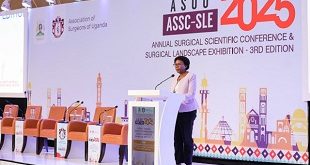
Parliament right to reverse directive requiring local governments to remit all local revenues to Consolidated Fund
COMMENT | WALTER AKENA | On Wednesday September 08, 2021, Parliament adopted a motion to urge government to reverse the directive requiring local governments to remit all local revenues to the Consolidated Fund. This must surely be a huge sigh of relief for LGs. The manner in which former local government leaders, now MPs passionately supported the motion, sharing compelling testimonies from their experiences in LGs, revealed the extent to which this directive weighed heavily on LGs.
While the decentralisation policy commenced with vigour initially, it has since been slowed due to several challenges. Recent attempts at recentralising key powers and functions of LGs, especially those relating to financial aspects, have slowed down the implementation of decentralisation and threatens to reverse the gains so far made.
A number of policy reforms have been made by the center to address “capacity gaps”, “incompetence” and “corruption” in LGs but which have proved calamitous. One such reform was the directive issued by the Ministry of Finance that LGs remit all locally raised revenue to the Consolidated Fund. Prior to the FY 2016/2017, LG budgets funded by local revenue were approved by respective LGs and monies collected from local revenues would be spent from the General Fund Account maintained at the district.
However, effective FY 2019/2020, the Ministry of Finance required that all local revenues be remitted to the Consolidated Fund and its budget appropriated by Parliament. The underpinnings of this directive, were; i) the need to harmonise the budget approval period for all revenue sources of local governments; ii) lack of accountability and transparency for local revenue; and iii) delays in reporting and preparation of financial statements because of scattered information.
These shortcomings of LGs notwithstanding, Finance should have addressed these issues rather than take away powers of LGs. Strategies such as penalties for non-adherence to reporting procedures and personal liability for defaulting accounting officers would have addressed these challenges.
The directives have proved counterproductive as they contradict the spirit of decentralisation, demoralise local government leaders and render them powerless.
The decentralisation policy envisioned strong, empowered and vibrant local governments as enshrined in Article 176(2) (a) and (d) of the Constitution of Uganda.
While the directive sought to streamline accountability issues at LGs and strengthen local revenue performance, it took away what had remained of the discretionary powers of LGs; in effect, subsequently contravening the above provision of the constitution by undermining the discretionary powers of LGs over their local revenues.
Most if not all, LGs have more than 80% of their budget funded through releases from Central Government which are unfortunately mostly conditional. This leaves LGs with very little flexibility, if any, to implement activities that are not catered for under the conditional grants. The conditionality involved within the framework of this directive further compounds the miseries of LGs.
While Ministry of Finance frontloads up to 25% of local revenue to LGs at the commencement of each financial year to kick start activities, subsequent releases are based on full recovery of the amount advanced which many LGs fall short of (The 2019/2020 Local Government Annual assessment revealed that on average, LGs collected only 44 % of their projected local revenues) and resultantly miss out on the releases. This greatly affects activities of the LGs that depend on local revenue such as council meetings, garbage collection, and others.
Furthermore, the requirement that LGs that collect over and above the projected local revenue in a financial year must raise requisition to Finance for a supplementary budget in order to access the surplus remittance has greatly affected the morale of local leaders to invest in creative strategies for local revenue generation, something partly responsible for the poor performance of local revenue in LGs. The long and tedious bureaucratic process involved in approving supplementary for LGs means that recovery of the surplus remittance sometimes takes an exceptionally long time.
To consolidate the gains of decentralisation, it is important that the recent recentralisation trajectory the policy has taken be reversed. The resolution of Parliament to urge government to reverse its directive on local revenue is a critical step in reversing this trend. Relatedly, when the directive is eventually reversed, LGs must take initiative to address the critical issues of revenue leakages and spending at source which greatly affect performance of local revenue.
****
The writer is a Project Officer, Local Government Council Scorecard Initiative at ACODE and can be reached on walter.akena@acode-u.org
 The Independent Uganda: You get the Truth we Pay the Price
The Independent Uganda: You get the Truth we Pay the Price



